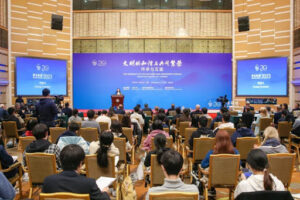The United Nations Committee on Economic, Social and Cultural Rights (CESCR) commended China for its progress on significantly reducing poverty at the CESCR meeting on 15 February 2023 in Geneva to consider China’s 3rd national report on implementation of the International Covenant on Economic, Social and Cultural Rights. This success had been recorded by the World Bank in April 2022 in a publication “Lifting 800 Million People Out of Poverty” to demonstrate China’s policies and to inspire other developing nations to follow China’s leadership. According to the World Bank, the success of China’s economic development and the associated reduction of poverty benefited from China’s effective governance. During the past three decades, China has achieved a considerable social transformation in conformity with its obligations under the International Covenant. China’s commitment to economic, social and cultural rights have positioned China, the second largest economy in the world, as exhibiting global leadership by exporting its policies to other developing countries. At the CESCR meeting, international Non-Governmental Organizations criticised China, asserting that it failed to comply with its human rights obligations under the International Covenant in relation to transnational business operations, physical and mental health, and labour rights for women.
Transnational business operations
China’s International Development Cooperation in the New Era outlined in its 2021 White Paper planned to promote precisely those social and economic rights enshrined in the International Covenant to benefit other developing countries. The International Development Cooperation Agency, established in 2018, has formulated Administrative Measures for Foreign Aid. China has been fully committed to human rights due diligence in its overseas operations, and the Chinese Due Diligence Guidelines for Responsible Mineral Supply Chains were launched in 2015. In addition, the China Chamber of Commerce of Metals, Minerals and Chemicals Importers & Exporters (CCCMC) has collaborated with the OECD in preparing the Guidelines. In 2020, the CCCMC reviewed the Guidelines and integrated the provisions of the UN “Protect, Respect and Remedy” Framework, the Guiding Principles on Business and Human Rights, adopted by the UN General Assembly as the principal normative framework for Business and Human Rights in 2011. In addition, China has incorporated the OECD Due Diligence Guidance which addresses business operations in conflict-affected and high-risk Areas.
Physical and mental health
NGOs have criticised China in the area of health rights, yet China’s record on its national health system is well documented and acclaimed worldwide. As the most populous country and the second largest economy in the world, China has created the world’s largest medical education system. China’s leaders ensured that health became an explicit national priority with the approval of the Healthy China 2030 Planning Outline in 2016 by China’s Central Party Committee and the State Council. According to the World Health Organisation, the development of a ‘Healthy China’ is central to the Chinese Government’s agenda for health and development, and has the potential to reap significant benefits for the rest of the world. According to UNICEF, China can provide a model and lessons to the advantage of other countries striving for universal health coverage. It is worth noting that China’s contribution to global health security was made during the Ebola outbreak in West Africa, supplying well-trained and self-sufficient medical teams when they were needed.
Labour rights for women
International NGOs have highlighted situations of discrimination of women in the workplace, and that women in rural areas are being marginalized. With the “Women’s Poverty Alleviation Action” in poverty-stricken areas (2015), the government has adopted measures where women’s federations promote women’s active participation in industries such as the farming and breeding industry, and rural e-commerce. TheWomen’s Protection Law, amended on October 2022, gives women stronger protection against sexual harassment and gender discrimination. This imposes new requirements on businesses regarding female employee management and addressing gender equality in performance reviews and promotions. in 2021, the government unveiled a new 10-year plan, the Outline of Women’s Development in China (2021-2030), with a strong emphasis on employment rights, its measures covering key areas including health, education, and the economy. It is expected that by 2030, the basic national policy of equality between men and women will be implemented, and the institutional mechanisms to promote equality between men and women and the development of women will be improved, as part of the government’s major efforts to eliminate discrimination and improve the status of women in China.
Beulah Naidoo
South Africa





